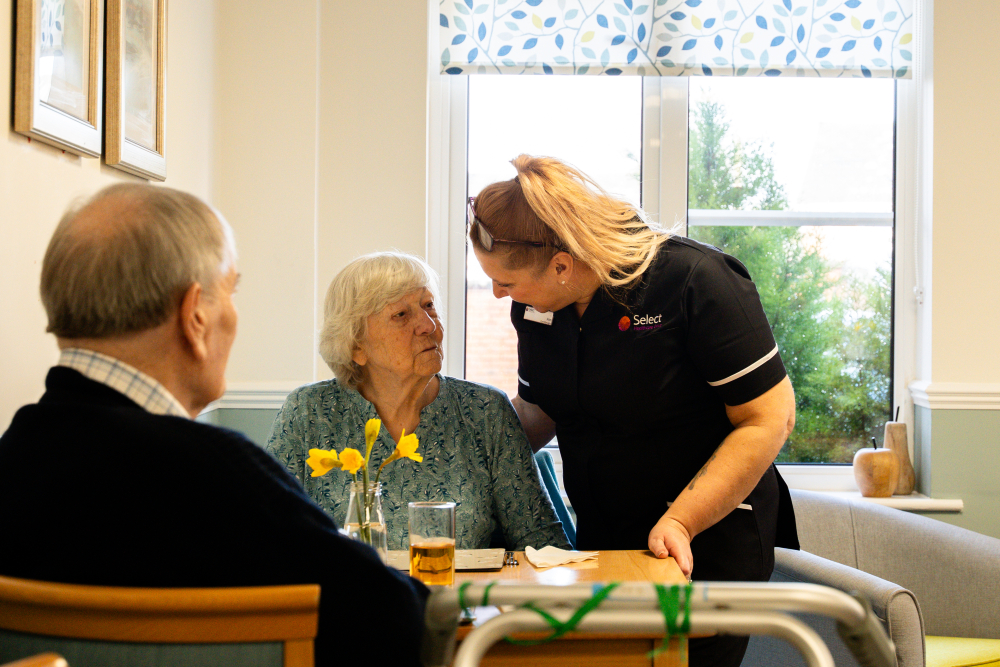
Some people will have to contribute towards their care home fees. Your local council will work out how much you may have to pay by doing a financial assessment. If you need any further guidance or advice, the Select Healthcare team are always happy to help, too.
Before you move into a care home, you’ll have a financial assessment with your local council. The council will look at your income and capital and decide how much you may have to pay towards your care home fees.
Examples of income include:
Your capital might include:
Before your financial assessment, make sure you’re getting all the benefits you’re entitled to. This is important because your contribution to your care home fees will be worked out as if you’re receiving all relevant benefits.
Local Authority Funding – England (2025–26)
If your capital is below £14,250, you may be eligible for maximum Local Authority support, meaning the council will pay the maximum they can towards your care home fees. You’ll still be expected to contribute from your income, but must retain a minimum Personal Expenses Allowance (PEA) or £30.65 per week to spend as you choose.
If your capital falls between £14,250 and £23,250, you’ll receive partial funding. In this case, you’ll be required to pay:
For example, if you had £15,250 in capital, that’s £1000 over the lower limit. £1,000 is four times £250, meaning you’d be required to add £4/week to your contribution.
If your capital exceeds £23,500, you will normally be expected to fund your care privately (self-fund).
Even if the Local Authority is paying for your care you will still have a say in which home you choose. The home must be suitable for your needs, fit within your personal budget and adhere to conditions set out in a contract between the home and Local Authority.
Local Authority Funding – Wales (2025-26)
In Wales, the capital limit for residential care is £50,000.
Regardless of the capital amount, you must be left with at least £44.65 per week—known as the Minimum Income Amount (MIA)—to spend as you wish. This allowance is protected for personal expenses such as clothes, toiletries, or outings.
The Local Authority must offer you at least one care home that meets your assessed needs and fits within the funding they provide. You may still choose a more expensive home if you wish, but a third party (often a family member) will need to pay a top up to cover the extra cost.
If your preferred care home charges more than the Local Authority’s standard rate, a third-party (such as a family member, friend or charity) can pay a top up to cover the difference, as long as it’s sustainable and written into a formal agreement with the Local Authority and the care home.
Generally, residents cannot pay their own top up unless:
Before agreeing to a top up, the Local Authority must offer at least one (England) or two (Wales) suitable homes that fit within the usual funding rate and meet your assessed needs. Only when no such options exist may a top up be required.
In addition, the third-party payer must be financially able to continue payments over time and the agreement must cover any applicable consequences and fee increases in case payments stop.
If your non-property capital is under £23,250, you may benefit from a 12-week property disregard before being classed as a self-funder. This means the council won’t count the value of your home for your first 12 weeks in the care home during which time they may help with your fees.
After this, if you can’t or don’t wish to sell your home straight away, a DPA (Deferred Payment Agreement) may let the council pay your care home fees for the time being. Under a DPA, you’re allowed to repay them later, usually when your home is sold.
As a self-funder, you still have the right to claim attendance allowance:
If you need nursing care in a care home:
If you’re eligible, NHS Continuing Healthcare (CHC) may fully fund your care via Integrated Care Boards in England or directly through NHS Wales.
If your non-property capital drops to £23,250 or below, you can apply to your Local Authority for support. You may have a financial reassessment which can enable them to help cover your care costs.
Initially, your home’s value may be disregarded for up to 12 weeks, after which you may qualify for a Deferred Payment Agreement (DPA). Under a DPA, the council contributes towards your care home fees as a loan that’s secured against your property value and repaid later when the property is eventually sold, rather than you having to immediately sell it.
If your current care home charges more than local funding is able to contribute and won’t lower its fees, you may need to move to a more affordable one or opt for a third party top up if there is someone who can pay it long-term.
If you’re in this situation, contact Social Services as soon as possible for a care and financial assessment.
Start your search for the right Care Home with Select Healthcare
